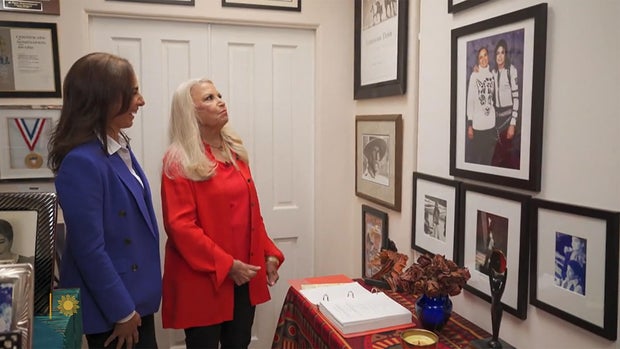Like many homes, Suzanne de Passe’s is filled with stuff. Her version of stuff? Gold and platinum albums. Snapshots with Stevie Wonder and a young Michael Jackson. The Oscar-nominated screenplay she co-wrote for “Lady Sings the Blues.” Her 2024 Rock & Roll Hall of Fame Induction Award.
De Passe is a giant in the music and entertainment industry … a trailblazing executive who moved Motown from Hitsville to Hollywood. She did it with raw talent and relentless determination.
“I had so many wonderful things to do,” she said, “and they were all hard, and they were all new – learning; making mistakes; getting my butt kicked; crying (tears of frustration, not sadness) – and little by little, I got my legs up under me.”

CBS News
Born in Harlem and nurtured in the historic Black community of Oak Bluffs on Martha’s Vineyard, de Passe says a supportive family gave her the tools to succeed.
I asked, “What were the lessons you learned from them?”
“I think more than lessons, it was values,” she replied.
By 19, she left college to book performers at the Cheetah Club in Manhattan. Her friend, Cindy Birdsong, had just joined The Supremes, and introduced de Passe to her boss, Motown founder Berry Gordy, who hired de Passe as his creative assistant.
“When he decided that I should come to the company, I asked for a contract,” she recalled. “He said, ‘I don’t do contracts.’ And I was there for 21 years without one, on a handshake.”
Part of her job was to find new talent, and that’s what she did, when de Passe first heard about a group of brothers from Gary, Indiana. They called themselves The Jackson 5.
“The hair on the back of my neck stood up. They were great,” she said.
“The hair literally stood up?”
“Yeah, the hair. This is my big barometer, back there, absolutely. When you feel something, it’s not intellectual, at all. I said, ‘Oh, my gosh, Mr. Gordy, I saw this great act.’ He said, ‘Great.’ I said, ‘Wait till you see these kids.’ He said, ‘Kids? I don’t want any kid acts. Are you crazy?'”
She wasn’t. And Motown introduced The Jackson 5 to the world.
The Jackson 5 “I Want You Back” on The Ed Sullivan Show by
The Ed Sullivan Show on
YouTube
de Passe took them to the dentist, worked on their early dance moves, and even picked out their wardrobe. She found Michael Jackson’s hat on 8th Street in Greenwich Village. “It was iconic, but nobody knew it at the time,” she said.
In the 1970s, she was discovering and developing artists for Motown in L.A., signing The Commodores, De Barge, and Rick James. “I feel like I’m lucky to be alive,” she laughed. Why? “Because Rick was bigger than life. He was a great consumer of drugs, and just a brilliant, brilliant artist.”
It is a notorious business, and difficult to navigate, especially back then, especially for her.
I asked, “You weren’t just a woman, you were a Black woman. Are you saying you faced, like, things coming at you, sexism, racism?”
“I have had every ‘ism’ to deal with,” said de Passe. “Sexism, racism, pessimism, optimism, you know? And what I’ve found is that the moment you let yourself be defined by your ‘isms’ is when you’ve lost.”
de Passe always persevered. She was also a good persuader, convincing Diana Ross that the song “I’m Coming Out” would be a smash hit. Ross’ first reaction, said de Passe, was, “in very blatant terms, ‘I hate these songs.’ But I felt it would be [a hit]. Nobody knows. That’s the thing about it. Nobody knows.”
“But clearly you have really good sixth sense?” I asked.
“I believe in what I believe in,” de Passe replied. “And some of it works and some of it doesn’t. But I’m happy to say I have a good percentage.”
In 1982, de Passe was made president of Motown Productions. One of her first big projects was the TV special “Motown 25: Yesterday, Today, Forever.” Nearly 50 million people watched Michael Jackson do the moonwalk. “Oh, my God. and it was only six seconds,” said de Passe. “But the whole ‘Billy Jean’ of it all was just magic, I think, because nobody had ever seen anything like that before.”
Michael Jackson – Billie Jean (Motown 25) (Remastered 4K) by
New Michael Jackson on
YouTube
de Passe also produced the landmark miniseries “Lonesome Dove.”
I said, “A lot of people would ask, ‘What does Motown know about westerns?'”
“Probably nothing; but I did,” de Passe replied. “I think the death of art is that you have to be gay to play gay. I think the death of art is that you have to be Black to direct or write a Black movie. The death of art is to not have the best person do what it is they are well-suited and passionate to do, regardless of all that other exterior stuff. And I am sick of it.”
At 78, she is still listening to her ear (and gut), finding new opportunities and stories to tell. And, with her induction into the Rock & Roll Hall of Fame, Suzanne de Passe is recognized as a true pioneer.
“I am so grateful to have had that moment to really feel that energy coming back to me,” she said. “I will also say, I have worked really, really hard.”
“For someone who worked behind the scenes and in the shadows, you felt seen?” I asked.
“Oh, definitely. I felt very seen, and very blessed.”
For more info:
Story produced by Gabriel Falcon. Editor: Steven Tyler.
See also:







